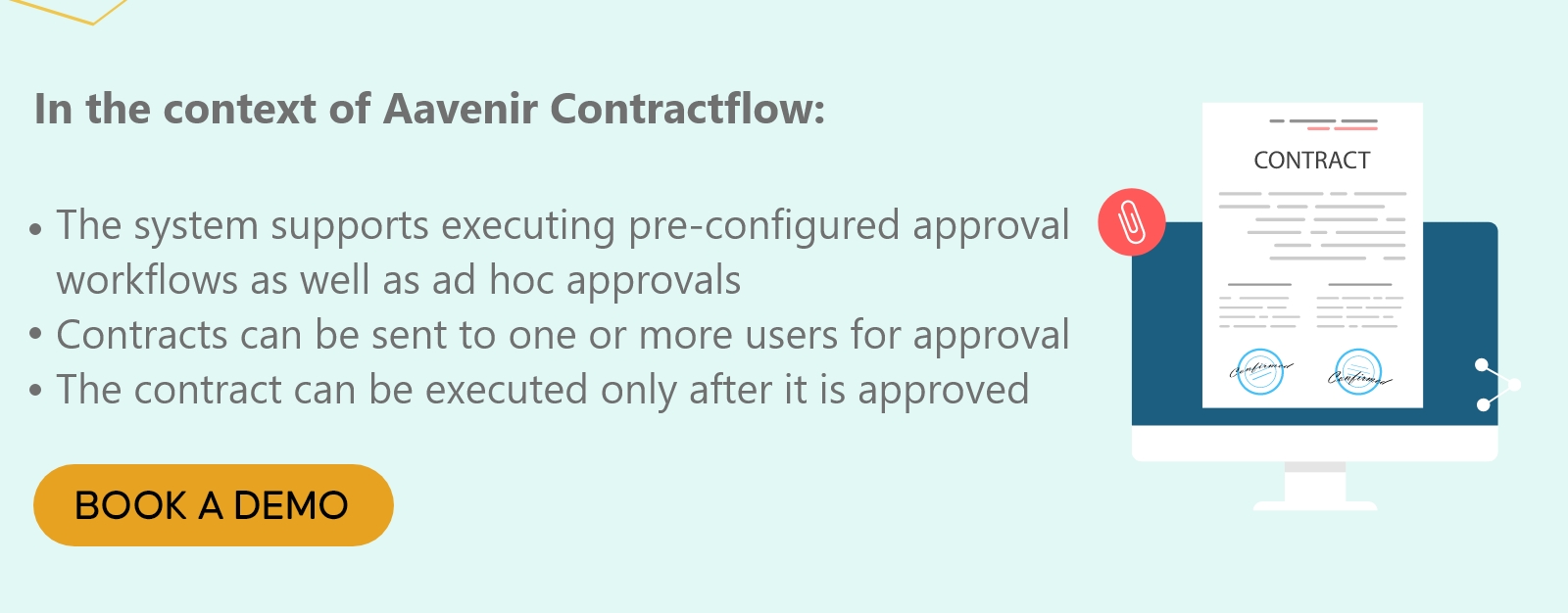Contract Approval Explained: How It Works
Contract approval is the formal authorization process by which a contract is reviewed, evaluated, and approved by authorized individuals or entities within an organization. It involves ensuring that the contract aligns with internal policies, legal requirements, and business objectives before it is executed.

What is Contract Approval?
Contract approval or contract acceptance is the process of providing consent to a contract after reviewing, verifying, and finalizing the terms and clauses. It is an essential step in the contract management lifecycle, ensuring that all terms are correct, compliant, and aligned with organizational goals.
Contracts are usually approved through signatures, and the approval process typically involves multiple stakeholders, such as legal teams, procurement officers, compliance officers, and finance teams. Each team reviews different aspects of the contract relevant to their operations.
Key Considerations for Contract Approval
Contract Review and Assessment
Conduct a comprehensive review of the contract to ensure that it aligns with the organization’s policies, legal requirements, and business objectives. This includes verifying the accuracy of the contract terms, assessing the associated risks, and evaluating the financial and operational implications.
Shorten your contract approval time by 85% with streamlined redlining and negotiation.
Authorization Workflow
Establish a clear and defined approval workflow to ensure that the appropriate individuals or departments review and provide their consent for the contract. This may involve multiple levels of approval, depending on the contract’s value, complexity, and organizational hierarchy.
Legal and Compliance Evaluation
Involve legal and compliance teams in the contract approval process to ensure compliance with relevant laws, regulations, and contractual obligations. This helps identify any potential legal risks or discrepancies and ensures that the contract meets the required legal standards.
Stakeholder Communication
Effectively communicate the contract’s details, purpose, and potential impact to relevant stakeholders who are involved in the approval process. This allows for informed decision-making and ensures that all concerns or questions are adequately addressed before granting approval.
Documentation and Record-Keeping:
Maintain accurate records of the contract approval process, including any modifications, negotiations, or additional agreements made during the review. Proper documentation serves as a reference for future audits, disputes, or compliance inquiries.
Contract Repository Integration
Integrate the contract approval process with a centralized contract repository or management system. This enables seamless tracking, monitoring, and retrieval of approved contracts, ensuring easy access to authorized versions and supporting documentation.
By implementing a structured and thorough contract approval process, organizations can ensure that contracts align with their policies, mitigate risks, comply with legal requirements, and support their overall business objectives. Effective contract approval fosters transparency, accountability, and compliance, leading to successful contract execution and positive business outcomes.

5 Reasons Why a Streamlined Contract Approval Process Is Important
1. Speeds Up Contract Signing
Long approval cycles can delay contract signing, which means missing out on valuable business opportunities. With slow or disorganized processes, contracts can get stuck in review stages, causing frustration for clients and internal teams alike. The longer the process takes, the higher the chance of deals falling through.
By streamlining the approval process, businesses can accelerate every step of the contact lifecycle management workflow. Automating approval routing and eliminating manual processes helps move contracts more quickly through the approval workflows. This ensures faster signing, reduced delays, and efficient deal closing for businesses.
2. Reduces Legal Risks
Legal risks are often the result of rushed or inadequate contract reviews. When the approval process isn’t streamlined, key legal checks can be overlooked or missed, leaving businesses exposed to potential disputes, financial losses, or contractual breaches.
A streamlined contract approval process ensures that legal teams are consistently involved and can review contracts thoroughly. Automated alerts and approval workflows help ensure no important legal clause is missed, mitigating legal risks and helping businesses stay compliant with regulations and internal policies.
3. Ensures Compliance
Ensuring compliance is a constant challenge, especially when contracts need to meet industry regulations or internal policies. Without a streamlined approval process, it’s easy for important compliance checks to be missed, which can lead to fines, penalties, or even legal action.
A systematic approval process incorporates automated compliance checks, ensuring that contracts are reviewed for regulatory adherence at every stage. By integrating compliance into the approval workflow, businesses can ensure that contracts meet all required standards. This reduces the risk of missing compliance requirements and helps maintain a strong legal standing.
4. Helps Create Accountability
A lack of accountability in the approval process can lead to missed deadlines, confusion about responsibilities, and a breakdown in communication between teams. Without clear visibility into who has approved what, it’s difficult to ensure timely and efficient contract execution.
You can improve accountability and transparency in the approval process by streamlining the contract approval process. Systematic approvals create clear accountability and help automatically track each approval stage. With visibility into who approved what and when, businesses can pinpoint delays and hold teams accountable, ensuring smoother and faster contract execution.
5. Reduces Errors and Omissions
Manual, disorganized contract approval processes increase the risk of human error. Key clauses might be overlooked, outdated versions of contracts could be reviewed, or vital details might be missed, leading to costly mistakes and potential legal disputes.
Streamlining the approval process reduces the chances of errors by automating repetitive tasks and ensuring that only the latest contract version is reviewed. Standardized templates and real-time collaboration ensure that nothing is overlooked. This reduces errors and omissions, resulting in a more accurate contract outcome.
Accelerate Contract Approvals and Close Deals Faster
Don’t let slow contract approvals hold you back. Leverage Aavenir’s AI to automate workflows, track approvals in real time, and close deals faster.
Speed-Up Contact Approvals With Aavenir Contractflow
Are you struggling to manage contract approvals at scale? Slow approvals and lengthy workflows can delay signing—creating bottlenecks in contract management.
Aavenir Contractflow is a contract lifecycle management software that solves this challenge by automating and simplifying approval workflows from start to finish. With AI-powered contract analysis, customizable workflows, and seamless integrations with other enterprise systems, Contractflow helps businesses:
- Automate approval routing
- Centralize communication
- Ensure compliance
- Track approval status
- Accelerate contract cycles
The result? A streamlined, efficient approval process where contracts move quickly across stakeholders for signing. To know more about Aavenir Contractlow, book a demo today.

